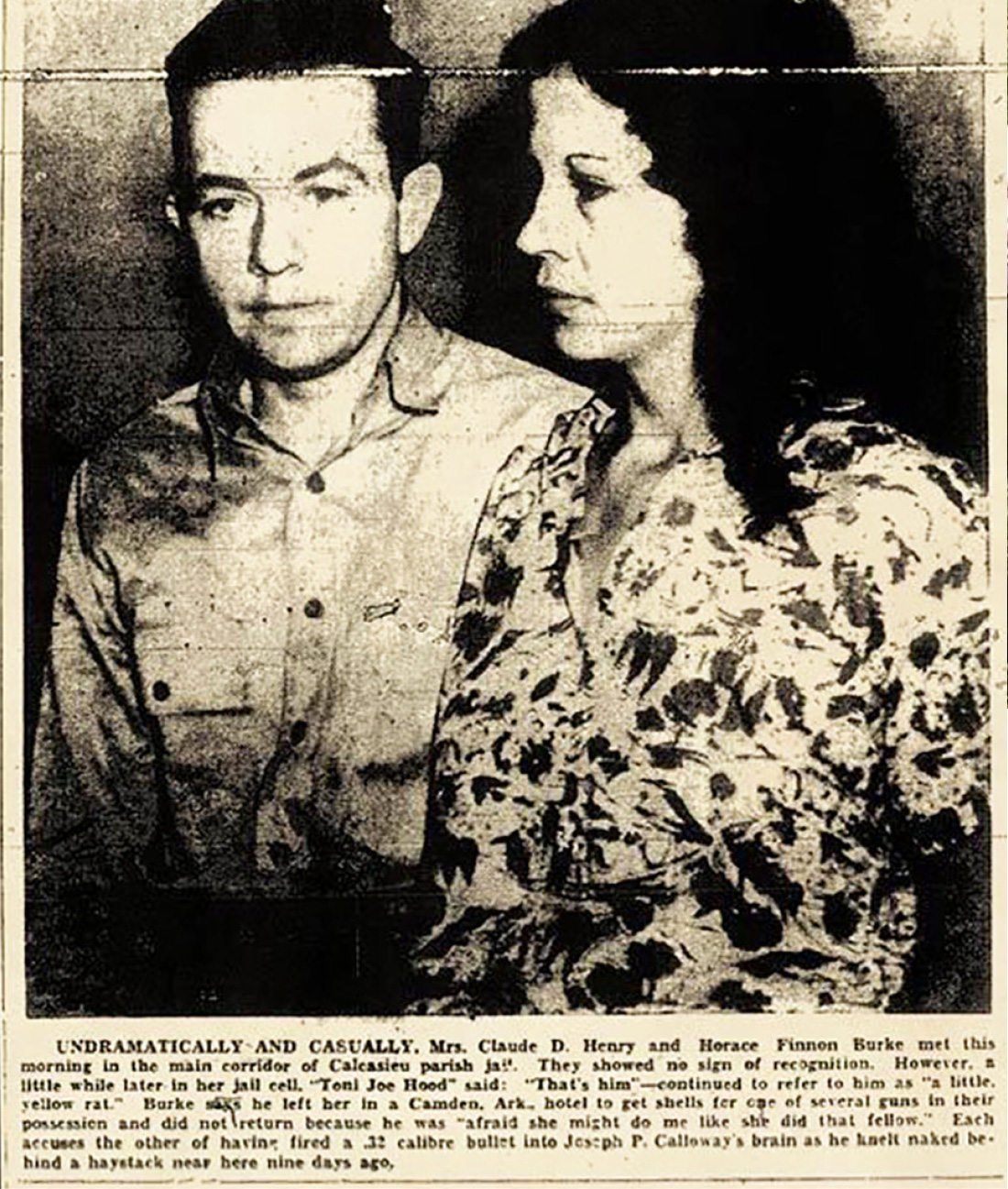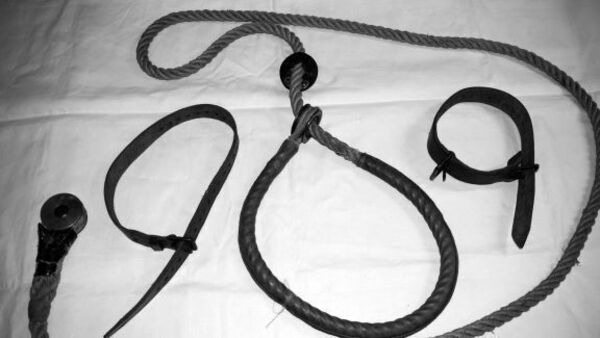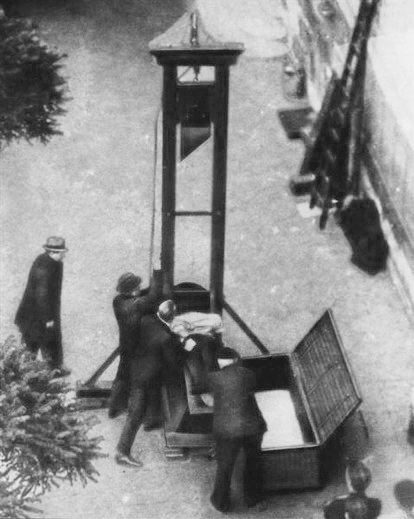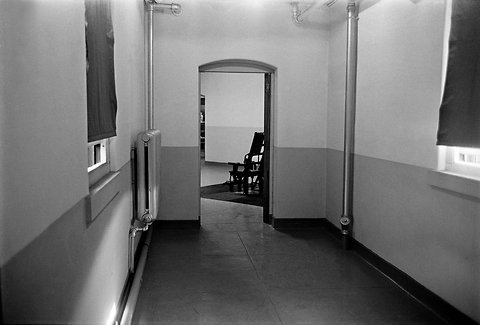Toni Jo Henry or, to use her proper name, Annie Beatrice McQuiston, holds a singular place in the criminal history of the State of Louisiana. Not even fellow Louisiana murderess Louise Peete (executed in California five years later) holds quite so individual a niche. They were both from Louisiana, were both murderers and both were executed but, while Louise Peete is one of several women executed by the State of California, Toni Jo Henry remains the only woman ever electrocuted by Louisiana. Louisiana since having replaced its electric chair with lethal injection, it’s highly unlikely that will ever change.
Toni Jo was originally from a respectable background by Southern standards, at least until her mother died of tuberculosis. After her mother’s death, her father took to drinking heavily and was seldom around to give her the guidance, support and discipline a child needs. With that in mind, it’s probably no surprise that she forged her own path and went off the rails.
Toni Jo was already consorting with known criminals by the time she turned fifteen. By her twentieth birthday she was a drunk and drug addict with a violent, aggressive temper and could only find work at a string of brothels. The last in a string of brothels was in San Antonio, Texas where she met the love of her life, Claude Henry.
Henry — known as ‘Cowboy’ Henry — was a boxer by trade and a second-rate boxer at that. The nearest he’d ever come to big-time boxing (and was ever going to( was a fight night in Beaumont, Texas. Hardly head-lining Madison Square Garden. In the language of the time Claude Henry was a palooka seldom booked unless no better fighters were available. There usually were and his lengthy list of losses proved it.
He also had his own rather shady secret. Toni Jo might have avoided discussing her dubious past and substance abuse, at least not at first. ‘Cowboy’ Henry, on the other hand, had neglected to tell her that he was only out on bail while appealing a murder conviction in Texas. She didn’t her it from him first, either. Shortly after her first meeting him the brothel madam (not wanting to lose her most popular employee) warned about his rather precarious legal position. It made no difference to Toni or Cowboy, they left anyway.
Despite their legal issues the twosome were soon married. They discussed whether Cowboy should jump bail but discarded the idea. Bail bondsmen usually have ties to bounty hunters and other, more violent hired hands if needed. With that in mind they decided to await the outcome of his appeal. They were both to be very disappointed. In the meantime Claude insisted on inflicting ‘cold turkey’ to try and cure Toni Jo’s drug habit, which worked albeit after much fighting, verbal and physical.
Claude Henry’s lawyers managed to get him a change of venue to Hondo and a retrial. It did him no good whatsoever. Henry had killed a man named Arthur Sinclair. According to Henry, it was self-defense when he disarmed Sinclair during a brawl and then shot him dead with his own gun. Henry’s claim was that, if he hadn’t killed Sinclair, Sinclair might have obtained another gun and then shot him in the back. Judge and jury begged to differ.
Sinclair had been a special policeman. Not a full-time lawman, but still a lawman. Henry was already an ex-convict and Texas was avowedly unmerciful with cop killers. Relatvely speaking, Henry was lucky. He’d only drawn fifty years in the feared Huntsville Prison instead of a seat in the ‘Texas Thunderbolt’ and permanent residence in Huntsville’s cemetery. Once convicted he was taken straight to prison. Claude Henry had managed to avoid the electric chair. Toni Jo Henry wouldn’t be as lucky.
Neither would Harold Finnon Burks, AKA ‘Arkie’ or ‘Arkansas’. Arkansas was a former jailbird and casual acquaintance of Claude Henry. A deserter from the US Army, he had also served time in Huntsville for burglary. His plan was simple. He’d string Toni Jo along with his inside knowledge, suggest he could help her arrange her husband’s escape, and that they visit his native Arkansas to obtain guns and a car. He actually wanted a free ride back to Arkansas and then to disappear without making his own troubles any worse. Just as bondsmen loathe bail jumpers, the US Army can be rough on deserters. In the end, Burks got it half-right. He did return to Arkansas, but it was only one stop on his journey to Louisiana’s electric chair.
After consulting her underworld contacts Toni Jo advised her husband to keep a clean conduct sheet at Huntsville in the hope of being moved to a prison farm as a reward for good behaviour. It worked, before long Cowboy was working on a less secure prison farm within the Huntsville system. Most importantly, he was working outside the prison walls. Now what Toni needed money, civilian clothes for Cowboy’s escape, and guns. She’d also, according to Burks, need a reliable, fast car. They quickly acquired all those things and a date with ‘Gruesome Gertie’ in the process.
Their plan, such as it was, was simple. They’d hitch-hike toward Huntsville using Toni Jo’s good looks and easy charm as a lure. When the right car came along they’d simply hijack it, rob the driver of his clothes, money and valuables, steal the car and make for Huntsville. Once there, they would take on the guards, grab Cowboy and flee Texas without being killed, wounded or captured. Quite how they expected this to work probably made sense on to Toni Jo.
At least, that was Toni Jo’s plan. To Burks, Toni Jo represented only a lift home. He had no intention whatsoever of involving himself in any jail-break and certainly not of taking on heavily-armed guards, road-blocks and posses for a casual acquaintance who wanted to escape. Only later and with a capital murder charge hanging over him, would he realise just how much his free ride would cost.
They hitch-hiked as planned, being polite enough to take lifts when they were offered and always looking for a suitable victim. They soon found one, a friendly Texan named J.P. Calloway. Calloway’s clothes were a tolerable fit for Cowboy. He had some money, a decent wristwatch worth pawned and was delivering a fast, reliable Ford V8 to Louisiana. He never got there alive.
Near the town of Sulphur, Louisiana and an oil refinery, Calloway suddenly found himself staring down two pistols. Toni Jo and Burks had bribed two juvenile delinquents while passing through Beaumont, Texas to burgle a hardware store of guns and ammunition. They forced Calloway into the trunk of the car and drove around looking for a secluded spot where they could rob him without attracting undue attention. Calloway, whose hand was severely injured when Toni Jo slammed the trunk, was ordered at gunpoint to walk behind a haystack where he was forced to stripped of his wallet, watch, clothes and then his life.
At his trial Burks claimed he stayed in the car while Toni Jo marched Calloway behind the haystack. The next thing he heard was a single gunshot followed by Toni Jo rushing back to the car carrying Calloway’s possession. Burks firmly denied having fired a shot, blaming Toni Jo entirely for Calloway’s murder. It made no difference. Regardless of whether Burks or Henry forced Calloway onto his knees and shot him point-blank between the eyes, they were both equally guilty of his murder.
The pair headed for Burks’s native Arkansas, arriving there three days later. In the town of Camden, Burks, terrified of the death penalty on top of his other problems, followed through with his original plan. He waited until Toni Jo fell asleep in their dingy motel room and promptly vanished, taking with him the car and Calloway’s watch and clothes. All he left behind was Toni’s .32-caliber pistol and a few dollars. Burks knew full well that, if he had been in relatively minor trouble before, he was in potentially fatal trouble now.
Waking up without an accomplice, money or car, Toni Jo panicked. Keeping the murder weapon in her handbag, she fled back to her native Louisiana and quickly made contact with a former employer, a brothel madam named Hattie. Hattie was immediately suspicious, of her unexpected arrival and the .32 pistol in her handbag. When she discovered that the pistol had been recently fired and still contained a spent cartridge, Hattie demanded the truth. Once she got it, or Toni Jo’s version, Hattie promptly packed Toni off to her aunt, whose husband held high rank in the Louisiana State Police.
Toni Jo’s aunt persuaded her to wait for her uncle’s return as he was away on official business. On returning to Shreveport he was horrified to hear her story. He was also in a very difficult position being both a murderer’s relative and a senior police officer. After much soul-searching, his professional duty won out. Toni Jo was questioned, arrested, and charged with capital murder. She lost no time in blaming Burks for Calloway’s murder, giving them his full name and as much information as she had. The net now began closing around Harold Finnon Burks.
He was arrested in Warren, Arkansas while hiding at his sister’s house. In the meantime, Toni Jo had taken officers to the crime scene, identified Calloway as the victim and repeated that Burks was the murderer. Both Burks and Toni Jo were indicted for first-degree murder. Both were now facing the death penalty and they both received it.
Despite the best efforts of their lawyers they were convicted and condemned to die by hanging, just prior to Louisiana replacing its gallows with the electric chair. The chair itself was unusual, a portable chair with its own generator, straps and cables nicknamed ‘Gruesome Gertie.’ While most States kept theirs at a particular prison and confined their condemned close by, Louisiana used its retribution roadshow to, quite literally, bring some power to the people.
It was stored at the infamous Angola prison and delivered to local jails and courthouses so prisoners could be executed where they had been sentenced. The State of Louisiana was determined that both Toni Jo Henry and Harold Finnon Burks would be among their new electric chair’s first victims. Both Toni Jo and Burks were equally determined that they wouldn’t be.
Toni Jo’s lawyers, despite being inexperienced, never having taken a capital case before and working for free, put on a campaign that the most expensive lawyers would have been proud of. They appealed against her sentence on several counts including Judge Hood’s alleged prejudicial conduct during the trial. Amazingly under the circumstances, they won.
Toni Jo was granted a new trial based on a higher court’s ruling about Judge Hood’s handling of the case. Burks’ execution was then postponed, enabling him to testify against his former co-conspirator. It did her no good. On February 3, 1942 their new trial began with Judge Pickrel presiding. The jury deliberated less than an hour before delivering guilty verdicts. Now re-convicted, both were re-sentenced to die.
This verdict was also overturned thanks to the prodigious efforts of Toni’s lawyers. Still working for free they appealed on nineteen counts, winning a third trial after claiming the prosecutor had improperly questioned prospective jurors during jury selection. A third trial date was set and, again, Burks received a stay of execution to testify against her.
Once more, Judge Pickrel was on the bench. Burks and Toni Jo were convicted a third time and again condemned to die. Fast running out of options, Toni Jo’s lawyers won a temporary stay on a legal technicality. The courts ruled quickly on the precise wording of the law changing the execution method and not in Toni’s favour. The method had changed, but the punsidhment for murder had not.
Her execution date was firmly set for November 28, 1942. Governor Sam Jones had already made it clear he would deny any appeals for clemency. Only days before her scheduled execution she finally had a change of heart. Despite having claimed at all three of her trials that Burks had fired the fatal shot, she now dictated a signed statement taking full responsibility for Calloway’s murder. It read simply:
“I, Annie Beatrice Henry, fired the shot that killed J.P. Calloway. It is my hope that Harold Finnon Burks will not have to suffer the death penalty.”
On November 23, 1942 an equally-desperate Claude Henry re-entered the story by escaping from Central Prison Farm No.2. He stole a truck with another inmate named Claude Byers and smashed through the prison gates headed for Lake Charles where Toni awaited electrocution. He also made it clear that if Toni was executed he would murder the sentencing judge. Security at Lake Charles Jail was significantly increased while armed guards provided 24-hour protection for Judges Hood and Pickrel.
Having read her final interview Claude Henry felt obligated to try and save her. Reasoning that she was doomed on his account, he simply had to rescue her. Toni herself thought he was mad to even attempt to spring her. Soon, this wasn’t an issue. Claude Henry was captured in Beaumont, Texas, only 66 miles from Lake Charles, when an alert motel manager recognised his mugshot and told visiting police officers which room he was in. They quickly smashed down the door and recaptured him before he knew what was happening. Claude Henry was promptly returned to Huntsville under maximum security to finish his full fifty-years.
The South being the South and Toni Jo being (theoretically, anyway) a lady, they did offer one small final concession. Claude Henry was allowed a single telephone call. She urged him to serve his time, go straight, and try to make something of himself. It was too late for her, but he still had some small chance of a relatively normal existence. She also made a last effort to help Burks, claiming again that she had murdered J.P. Calloway. It did Burks no good. On March 23, 1943, months after Toni Jo, Burks sat in the same chair for the crime he had not committed but did nothing to prevent.
The fatal day dawned. At Lake Charles Jail the portable chair was delivered from Angola and thoroughly tested. It was working perfectly, as expected. Louisiana had already electrocuted five prisoners since discarding the gallows in 1940. Toni Jo Henry would be the sixth prisoner, the first woman in Louisiana and the fourth of six electrocutions in 1942. Louisiana’s travelling electric chair and its travelling executioner, former Texas lawman Grady Jarrett, were only just getting started.
All her appeals had been denied and Governor Sam Jones hadn’t changed his mind. He was still rejecting any requests for clemency. Toni Jo’s head was shaved and, objecting to this, she was permitted to walk her last mile wearing a red bandana to hide her freshly-shaven scalp.
At noon, the execution party arrived at her cell led by local Chaplain, Father Richard. Toni had been baptised a Catholic while awaiting execution and he remained at her side throughout. She entered the death chamber, quickly seating herself while the straps and electrodes were adjusted. As she sat in ‘Gruesome Gertie’ Toni was silently praying, just as J.P. Calloway had been when she shot him between the eyes.
All was ready. Only a silent signal from the officer in charge was needed. Just after the clock struck noon that signal came. Jarrett bade her his now-customary farewell, saying “Goodbye, Toni Jo.” before throwing the switch. With a jerk of his hand 2000 volts shot through her body. Watching her carefully , he worked his controls raising and lowering the volts and amps in a carefully-delivered cycle lasting approximately two minutes.
At 12:12pm the case was concluded. Doctors checked her smoking body and certified her dead. A squalid end to a tragic case in which three people died, none of whom had to. As for Claude ‘Cowboy’ Henry, whose incarceration had set the ball rolling in the first place, he was paroled suffering from heart disease. He died only a couple of months after his release. His end was no less pathetic and senseless than those of Toni Jo Henry, Harold Finnon Burks or J.P. Calloway.
Claude ‘Cowboy’ Henry was shot dead in July of 1945.





Leave a Reply